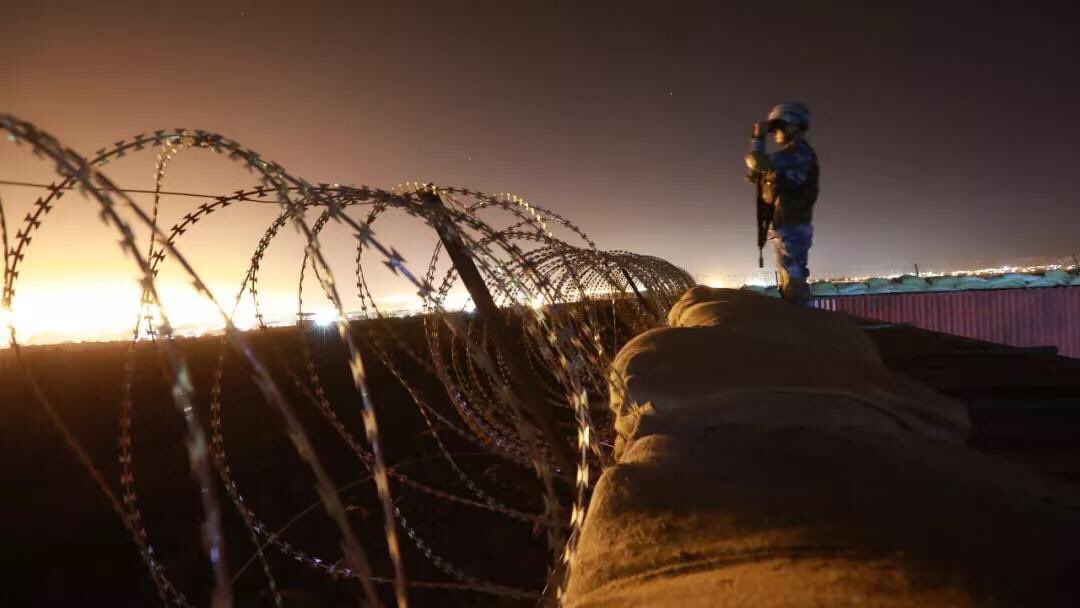Senior U.S. defense officials are growing increasingly concerned that the Chinese military can monitor and potentially target U.S. and allied satellites from a new deep space ground station in the Western Hemisphere, located in the deserts of Patagonia.
In wide-ranging testimony before the U.S. Congress on Feb. 7, Adm. Craig Faller, the newly confirmed commander of U.S. Southern Command, warned lawmakers about China’s accelerated expansion into Latin America. Not only does China support the autocratic regimes in Venezuela, Cuba, and Nicaragua and employ predatory lending practices across the region, but it is also investing in key infrastructure such as a deep-space tracking facility in Argentina, Faller told lawmakers.
U.S. military and intelligence officials have been watching the development of this particular facility with growing alarm since its inception. Over the past few years, a powerful 16-story antenna has risen from the remote, 200-hectare compound in the Neuquén province. But the station, which is surrounded by an 8-foot barbed wire fence, operates with little oversight from Argentine authorities, experts say. The ground station reportedly began operations in
.
China has insisted that the aim of the facility is peaceful space exploration and observation. For example, it is said to have played a critical role in China’s landing a spacecraft on the dark side of the moon in January.
Brian Weeden, a space policy and security expert with the Secure World Foundation, noted that the United States deploys antennas similar to the one in Patagonia all around the world.
“Unless there is something specifically different about this, it’s a little bit of the pot calling the kettle black,” he said. “To me, there is no specific piece of evidence other than it happens to be Chinese that signals that it is nefarious.”
But the U.S. military is concerned that the big-dish radar could be used for another purpose: collecting information on the position and activity of U.S. military satellites.
“Beijing could be in violation of the terms of its agreement with Argentina to only conduct civilian activities and may have the ability to monitor and potentially target U.S., allied, and partner space activities,” said Faller, who until recently served in the Pentagon as the top military aide to former Secretary of Defense James Mattis, said in his written testimony to the Senate Armed Services Committee.
Both China and Russia have multiple ways of taking out or disabling U.S. and allied civil and military satellites, which provide critical navigation, communication, and command-and-control services around the globe, according to a report by the U.S. Air Force’s
. China has military units that have already begun training with anti-satellite missiles like the one used in a 2007 test to destroy a Chinese weather satellite, generating more than 3,000 pieces of dangerous debris that are still orbiting the Earth and endangering nearby space assets.
In addition to anti-satellite missiles, both nations have capabilities to jam U.S. and allied satellites, such as the ones that control unmanned U.S. military aircraft, according to the report. Airborne lasers can also be used to temporarily or permanently blind imagery satellites and other sensors. Cyberattacks on key infrastructure, such as ground-based space stations, also pose a threat.
The U.S. intelligence community also believes China and Russia’s space capabilities are a risk to U.S. forces, even as both countries push for international agreements on the non-weaponization of space.
In addition to the operational Chinese army missile intended to target satellites in low-Earth orbit, China likely intends to pursue additional weapons capable of destroying satellites up to “geosynchronous” Earth orbit, Director of National Intelligence Dan Coats said in his Jan. 29 testimony to the Senate Select Committee on Intelligence.
“China’s and Russia’s proposals for international agreements on the non-weaponization of space do not cover multiple issues connected to the [anti-satellite] weapons they are developing and deploying, which has allowed them to pursue space warfare capabilities while maintaining the position that space must remain weapons-free,” Coats said, according to his written testimony.
Experts noted that Beijing’s claim that it will use the facility only for peaceful purposes can’t be taken at face value, as the Chinese national space agency is closely linked with the People’s Liberation Army.
Frank Rose, who served as U.S. assistant secretary of state for arms control from 2014 to 2017 and currently is a senior fellow with the Brookings Institution, said the geographic location of the new station provides China critical space coverage in the Southern and Western Hemispheres.
“It’s a question of covering certain orbits. There’s a reason why the U.S. has satellite tracking stations around the world—it gives you global coverage,” Rose said. “You can’t get global coverage from China.”
Evan Ellis, a professor of Latin American studies at the Strategic Studies Institute of the U.S. Army War College, said the ground station’s primary purpose may in fact be for peaceful research. The general shape and size of the dish is “consistent with what the Chinese say that it is,” he said, noting that the location “does make a certain amount of sense” because scientists need facilities positioned on all sides of the Earth for deep-space observations.
The personnel who operate the facility are either active-duty or former Chinese military, but that is “not inherently nefarious” given how closely the army is tied with the Chinese space program, Ellis said.
However, Ellis noted that the facility could also be used to collect other types of data, particularly on the various sensitive commercial and military satellites that frequently pass overhead.
It is also concerning that the Argentine government “really doesn’t have physical access” to the compound, he added, noting that it is a six-hour drive from the closest government facility.
Rose applauded the Trump administration for increasing its focus on space, including the plan to re-establish U.S. Space Command, but said that one “gaping hole” in their approach is the lack of diplomatic outreach to China on this issue. The Obama administration in 2016 held two rounds of space security talks with China, one in Washington and one in Beijing, he said, noting the participation of the State and Defense Department. But the Trump administration has not continued these talks, he said.
“I will give the administration some credit, they are focused on the threat to our space systems, and I give them credit for focusing public attention,” Rose said. “However it is not just a military solution to this problem—yes we have to protect our systems in outer space, yes we need to be prepared to respond to attacks, but there has to be a role for diplomacy.”









